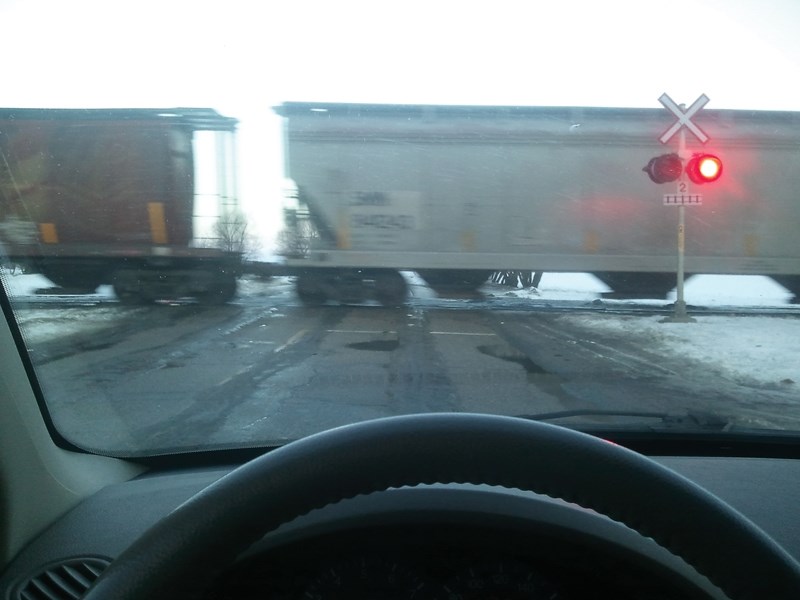Emergency services providers in Westlock are worried that blocked rail crossings in town may affect response times to Whissellville in an emergency.
At the town’s Jan. 19 committee of the whole meeting, councillors met with representatives from Westlock RCMP, the Westlock fire department and Westlock Terminals to discuss those concerns; representatives from CN were scheduled to attend but couldn’t make it due to a collision.
But even without all the parties present, mayor Ralph Leriger said the issue should be addressed.
“This issue came as a result of some phone calls and concerns raised not just from citizens but from our emergency responders,” he said. “There has been, at times, all three entrances across town blocked.”
RCMP Staff Sgt. Dwayne Rawson said police got a call over the summer to the storm pond in Whissellville, and upon trying to respond found that all three crossings were blocked for a lengthy period.
“We timed it, and it was probably about 20 minutes it was blocked off all three,” he said. “It wasn’t a priority call otherwise we would have scooted around.”
Fire chief Stuart Koflick said the department has done some drills to simulate a call in Whissellville with all three crossings blocked.
“It put a considerable amount of time onto our response time to travel either to the south next crossing or the north next crossing to make it back into Whissellville,” he said.
Koflick added he understands Transport Canada regulations say that rail crossings cannot be blocked for more than five minutes at a time — which is still quite significant when dealing with emergency response.
“We’re looking to work with CN to understand how we can resolve some of these issues,” he said. “We understand the Terminals are increasing production, and whether that’s going to have an impact on the crossing as well.”
Westlock Terminals manager Cliff Bell explained to council some changes coming to their operation in the near future should rectify the issue — so long as CN’s plans come to fruition as well.
He said the Terminals took control of all three tracks at the site on Oct. 1, 2014; two train cars can be loaded at once now, since the facility expanded its operations.
“Their (CN’s) intention at the time was to build a passing track somewhere outside of town, then we would take over operations on all three sidings there,” he said.
That didn’t happen by Oct. 1, and the Terminals negotiated with CN to have the railroad continue using the passing track until April 1, 2015.
Although there has been little evidence of track construction in the Westlock area, the Terminals will take possession of a vehicle to move cars around without CN’s involvement.
“Come April 1, if we do take over the passing track and they’re using a passing track somewhere else, that should help because then they won’t be needing trains there starting and stopping in Westlock,” he said.
“The amount of time CN drops off cars should be significantly less.”
Leriger said while the conversation was appreciated, ultimately these are issues that must be addressed with CN as well.
“We need to have that conversation and we can’t have it if they’re not in the room,” he said.
Councillors also discussed the issue of pedestrian safety in crossing the tracks, which is a perennial issue in Westlock and other communities with rail lines coming through.
Bell said in building the expansion, Westlock Terminals fenced off part of the property — not the entire length of the land but the building itself — but they’re still seeing some foot traffic crossing.
Leriger noted the town had approached the Terminals about building some type of pedestrian overpass in conjunction with the recent expansion, but the idea was rejected by CN.
In the meantime, pedestrians can still be seen crossing the tracks at all points, not just at the two controlled crossings at 97 Avenue and 103 Avenue.
Bell said once the Terminals takes full possession of all three tracks, there would be a need to be more stringent about enforcing a no-trespassing policy in the interest of public safety.
“When we get the trackmobile and we’re going to be chugging around there at all hours of the day, it’s going to be something we’re really hard on,” he said.
“Whether that be fencing off or whatever, that’s going to be one of my main worries — somebody getting injured out there.”
Bell noted the company would be happy to work with the town on whatever easements may be required to ensure pedestrians can cross the tracks safely.



